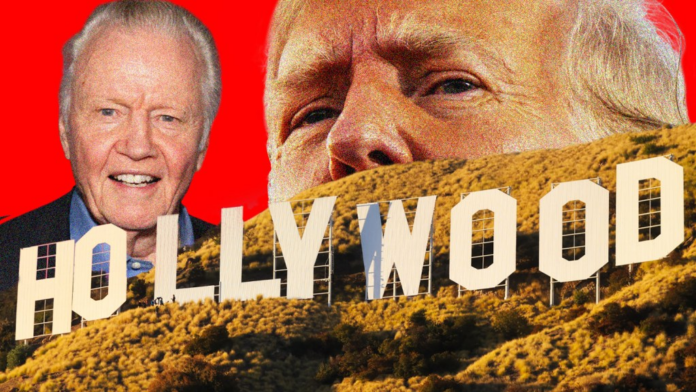Nearly five months after President Donald Trump announced his “special ambassadors” to Hollywood, one of them appears poised to present a plan to revive the film and television industry in the United States — but what, exactly, does that entail?
Jon Voight has been taking meetings around town with union reps and studio executives to understand the issues plaguing domestic production, Deadline has confirmed. So far, Voight met with the Directors Guild of America, Teamsters and IATSE, sources tell us. The Writers Guild of America has not met with Voight, and it’s unclear whether SAG-AFTRA has entertained a conversation.
We understand that Trump’s other two ambassador picks, Sylvester Stallone and Mel Gibson, are not involved in Voight’s conversations. The Tulsa King star and Passion of the Christ filmmaker have not facilitated any formal discussions on the topic on their own either, it seems.
Watch on Deadline
The exact plan that Coming Home Oscar winner Voight, whose daughter is Angelina Jolie, has prepared for Trump is unclear, but sources with knowledge of his conversations with Hollywood insiders tell us they expect a federal tax incentive to be the main component.
As the lack of production in L.A. displays, the U.S. film and television industry has suffered greatly from a growing number of runaway productions over the years. International territories including the UK, Canada and Hungary have significantly beefed up their own financial incentives, tax credits and infrastructure during the past decade. Stateside, while individual states from the heavy hitters of New York and Georgia to smaller jurisdictions like New Mexico have done what they can to bolster their own local industries, union representatives have been raising the idea of a federal tax break to further incentivize domestic production for some time.
Donald Trump and Sylvester Stallone in 2024 Joe Raedle/Getty Images
D.C. and Hollywood insiders say they are skeptical about whether the Trump administration would go for something like this, though. The president long has demonstrated a general disdain for Tinseltown — despite his own past as a reality TV star — especially after its outpouring of support for former Vice President Kamala Harris’ presidential run.
RELATED: Kamala Harris Avers Poll-Sagging Trump DOGE Agenda “Is Not A Vision That Americans Want”
Also, sources have pointed out that any major funding initiative using taxpayer dollars would contradict the administration’s rhetoric on trimming the fat from the federal budget and bringing down the national debt. The Trump administration has spent four months gutting federal agencies and slashing funding for infrastructure, research and more. Never mind that federal spending in Trump’s first 100 days is up $200B from this time last year.
However, bolstering domestic film and television production is in line with Trump’s agenda to bring jobs back from overseas, more generally. In his Truth Social decree in January, Trump said he was appointing Voight, Stallone and Gibson with “the purpose of bringing Hollywood, which has lost much business over the last four years to Foreign Countries, BACK—BIGGER, BETTER, AND STRONGER THAN EVER BEFORE!”
He also vowed to “get done what they suggest,” so there is the possibility that Trump would entertain the idea if it came from the right person. How that will go over with his constituency is another question altogether.
RELATED: “Frankly, I Never Heard Of You”: A Testy Donald Trump Tussles With Terry Moran During Contentious ABC News Interview Marking POTUS’ First 100 Days
Sources with knowledge of Voight’s conversations around Hollywood have said that union and studio leaders have tempered expectations about what might come from his appeal to Trump.
Jon Voight and Donald Trump in 2020 Mandel Ngan/Getty Images
Voight’s efforts come as Hollywood’s major unions are focusing their attention more specifically on bringing production back to California. In October, Gov. Gavin Newsom proposed an expansion of the state’s Film & TV Tax Credit Program cap from $330M annually to $750M. Deadline understands that this is very high priority for Newsom, and he’s very determined to make sure it’s approved by the Legislature.
If approved, it would give California a much-needed leg up as the second-largest film and television tax incentive program in the country after Georgia, which has no limit on its spending.
RELATED: Hollywood’s Show Of Force: Over 100,000 Letters Of Support Sent To CA Lawmakers Ahead Of Key Hearings On Expanded Film & TV Tax Credit Proposal
California lawmakers also are weighing two bills, SB630 and AB1138, that are aimed at making some significant changes to the program beyond simply offering more money. Those changes include expanding eligibility and boosting the individual credit amount available to each production. Union reps have stressed that the issue is not simply budget but rather that California’s program, which unlike other states is a jobs initiative that directly ties eligibility to the amount of jobs a production is going to create, must undo some of the red tape that has made it nearly impossible for new projects to receive any meaningful funding.
Right now, the bills are working their way through Senate and Assembly committees on their way to the floor and have received resounding support from lawmakers so far. The bills also are heavily supported by California production workers, who have sent more than 100,000 letters of support to Sacramento in hopes it’ll help move the needle.
Ted Johnson and Dominic Patten contributed to this report.


